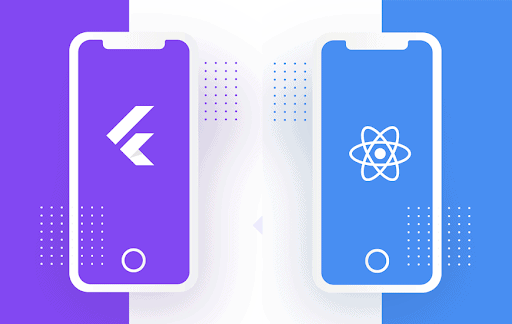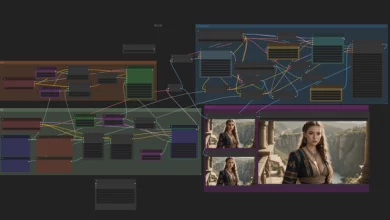
Programming tools used for the development of cross-platform apps have gained immense popularity in recent times. Top-notch brands like UberEats, AirBnB, Myntra, Bloomberg have developed cross-platform apps to eliminate the shortcomings of hybrid and native development.
Unlike conventional development procedures, cross-platform development is faster and the end product delivers a better user experience. It learns from the drawbacks of native and hybrid development and offers efficient apps.
They are developed with the help of CSS, Javascript, and cross-platform frameworks like React Native, Flutter, Xamarin, etc. These programming tools are not native to an operating system. Their codes can be reused across platforms.
It is important to decide which of these frameworks will be the best choice for your next cross-platform app development project. So, let’s compare the top two cross-platform frameworks: React Native vs Flutter.
React Native vs Flutter #1: What Statistics Say
#Stat 1: Google Trends: It is one of the best ways to compare the popularity of programming technologies in the search engine. Looking at the graph below we can easily see the popularity of React native is more than Flutter over the past 12 months.

#Stat 2: Nmp Trends: It shows the number of downloads and stars. Below is a graph that depicts that react native has many more stars and downloads in comparison to flutter in the past 3 months.

The above two stats make it clear that React native is a more popular and adopted programming tool in comparison to flutter. But, this does not mean that react native is better in every aspect. Maybe the other framework like flutter is more suitable for your cross-development project. Let’s compare them to other parameters.
Summary: In both statistics, React Native is a more popular and widely adopted programming tool in comparison to Flutter.
React Native vs Flutter#2: An introduction to the background
React Native is an open-source framework that was created by Facebook to be used with react JS. It was launched in 2015 for cross-platform app development. The applications made with React Native can be used on iOS and Android by using the same codes.
It has a big community with a stabilized API. The Facebook team has given a complete focus on fixing all kinds of issues. Top-notch apps developed on React Native are Instagram, Facebook Ads Manager, Skype, Pinterest, Bloomberg, etc.
Flutter was created by Google and officially launched in 2015. It is an open-source UI software development kit. Previously its name was Sky and in 2018 Flutter was finally launched.
It has design specific widgets, dart platforms, foundation libraries, etc. Some popular apps built with the help of flutter app development company are Google Ads app, Xianyu app by Alibaba, Hamilton app, Topline app by Abbey Road Studios, Hamilton app, etc.
Summary: React native is older than Flutter in comparison to the launch date. Both have strong organization back-up and many top-notch apps are built on them.

React Native vs Flutter #3: Architecture
It is crucial to learn about the technical architecture of the framework. Only then can you make an informed decision about whether to use a programming tool or not. So, let us learn about the technical architecture of React Native and flutter.
React native architecture is mostly dependent on the JS runtime environment which is also known as Javascript bridge. It is also using Facebook’s Flux architecture. In a nutshell, it is using the Javascript bridge to connect with native modules.
Flutter architecture is using the dart framework. It does not need any bridge to communicate with native modules. Dart has many frameworks that are inbuilt and makes it bigger in size. In a nutshell, flutter has everything which is required for app development in its engine.
Summary: React native depends on JS bridge to communicate with native modules but flutter does not need any such bridge.
React Native vs Flutter #4: Setup, Documentation, and Configuration
It takes time to set up a machine for custom software developers. There is a lot of software installation that takes time. Hence, make sure that the programming technology you are choosing has proper documentation to allow users to run it anytime.
React native project assumes that you have all the needed setup for the development of iOS and Android platforms. The information is limited, which is not enough to start smoothly. It will jump all the steps and take you directly to the step for starting a new project.
Flutter has a detailed guide to start with platform setup for both platforms, including Android and iOS. There is a tool called CLI that inspects the tools that are already installed and which are required to be configured. The whole setup process is quite easy and supported by tools.
Summary: The documentation support of Flutter is stronger in comparison to that of React Native.

React Native vs Flutter #5: UI Component and Development API
Whenever you are developing a native application, it is important to check if the support for native components is provided or not. It is crucial that the framework also has an API. This will enable you to access the native modules seamlessly.
React Native framework will provide the developers with device access APIs and UI rendering only. React native is dependent on third-party libraries to access a large number of native modules.
Flutter framework comes with plenty of UI rendering components, navigation, testing, device API access, and a lot of libraries. This eliminates the requirement to be dependent on third-party libraries. If you will get this framework, you will have everything to develop mobile apps.
Summary: React Native has fewer UI components and API access as compared to flutter.

React Native vs Flutter #6: Productivity of developers
It is one of the most important deciding factors when it’s about faster development. Better developer productivity will ensure quick app building. Let’s check the framework Flutter vs React for this factor.
React Native has a feature called hot reload that saves the testing time of React native developers for the UI changes. If a developer is skilled in Javascript, then it will be highly convenient to use those skills for cross-app development using React Native.
Flutter complexity may grow with the new stages after the initial start. As this complex Flutter starts unveiling, it will be required that developers learn and grasp the new concepts of this framework. Moreover, Dart is not a common programming language like Javascript, so there can be a huge lack of support.
Summary: React native support for the developer is more in comparison to that of flutter as the latter is new to catch.
React Native vs Flutter #7: Community Support
Community support refers to a number of developers who have adopted a particular technology. As soon they show interest in the framework and use it in the development process, they become a part of the community where its knowledge can be shared.
React Native has seen large support since its launch in 2015. There is a big community of React Native developers who meet at various conferences around the world. According to Statista, React native is the fifth most used framework of the world in 2019. Below is a graph to depict their findings.

Flutter has started gaining popularity recently. And its community is growing and conferences are taking place. Still, the developers do not have the resources to solve regular issues.
Summary: React-native community is growing since its launch but flutter is new in its comparison and still has good community support.
Final words:
As we discussed the comparison of Flutter vs React native on various parameters, we discovered that they both have their own pros and cons. Here are the points which we can conclude on the basis of the above comparison.
- In both statistics, React Native is a more popular and widely adopted programming tool in comparison to Flutter.
- React native is older than Flutter in comparison to the launch date. Both have strong organization back-up and many top-notch apps are built on them.
- React native depends on JS bridge to communicate with native modules but flutter does not need any such bridge.
- The documentation support of Flutter is stronger in comparison to that of React Native.
- React Native has fewer UI components and API access as compared to flutter.
- React native support for the developer is more in comparison to that of flutter as the latter is new to catch.
- React-native community is growing since its launch but flutter is new in its comparison and still has good community support.
React Native and Flutter can be used to build cross-platform apps depending on the needs of your organization. If you are still confused about which programming tool is most suitable for your next cross-platform app development then consult with a reputed mobile app development company in India.




